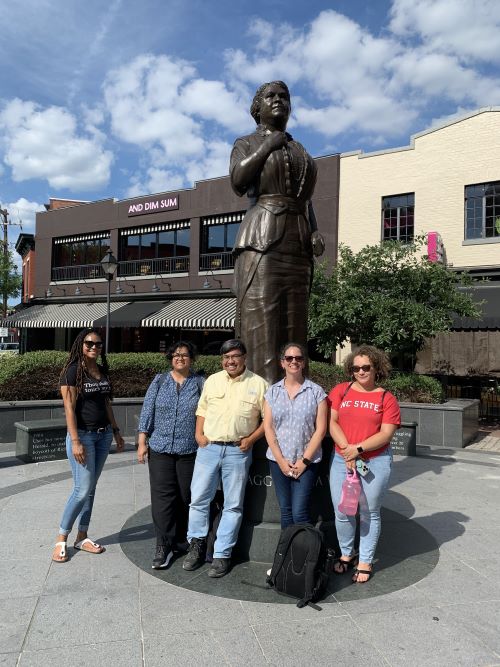NEH Institute, Place-Based Research, and Teaching
August 30, 2024 / Dan Bacalzo, PhD
The Lucas Center supports faculty teaching, scholarship and service by funding attendance and presentations at conferences and other forms of professional development. In Summer 2024, Associate Professor, Dan Bacalzo, Ph.D. was awarded funding to utilize toward the National Endowment for the Humanities Institute (NEH). To learn more about Dan's opportunity, please see his blog below.
This past summer, I participated in a National Endowment for the Humanities Institute entitled “Towards a People’s History of Landscape: Black & Indigenous Histories.” The program included both an online component as well as a two-week residency in Richmond, VA engaged in place-based research. Participants met with guest artists and scholars; visited numerous locations in the Richmond area relating to readings and discussions; and were assigned “place teams” to work on short projects.
NEH Institutes are a wonderful and productive way for faculty to engage in professional development with peers from across the country. More information about future sessions, including how to apply, can be found at https://www.neh.gov/divisions/education/summer-programs. This is the second institute I’ve participated in (the first was in Summer 2015, right before I started at FGCU), and both experiences included wonderful conversations around shared readings and group field trips. I haven’t studied so hard to keep up with all the material covered since grad school!
Among the highlights of the NEH Institute was an excursion to the Rappahannock Tribal Lands, where we met with Chief Anne Richardson. She described the valuable work she’s done in the area of conservation, noting how her indigenous tribe is able to “use our sovereignty to protect natural resources.” She talked about the distinction between ownership and stewardship, and how the Western tradition emphasizes the former at the expense of the latter. She also regaled us with the amusing and fascinating story of how she met Queen Elizabeth II and led a ceremony to renew the covenant England had with native tribes, which had been broken by the American colonists.
The NEH Institute’s organizers divided participants into small groups, with the assigned task of creating teaching modules inspired by the work presented at the seminar. My group focused on the legacy of Maggie L. Walker, an African American entrepreneur who had a significant impact in the early 20th century, and who is memorialized in numerous ways in contemporary Richmond. We toured her former home, which is now a museum, and visited (either as individuals or in groups) several other locations of interest such as the St. Luke Building, former site of the newspaper Walker edited as well as the original location of the bank she founded; the Maggie Lena Walker Memorial Plaza, which features a large memorial statue dedicated to her; Evergreen Cemetery, where she is buried; Penny’s Wine Shop, named as an homage to Walker and her Penny Savings Bank; and the Maggie L. Walker Governor’s School, originally a Jim Crow-era high school for African Americans, and now a magnet school for gifted students.
Not only was this a great way to get to know some of my fellow participants better, it allowed us to focus on ways we might utilize what we learned during the NEH Institute in our own teaching. I am particularly interested in applying some of the readings and ideas from the Institute for my Ecologies of Performance course, one of the newly approved offerings that will now fulfill FGCU’s Sustainability Course Graduation Requirement (SCGR). I’ve been re-tooling the course over the last several months in anticipation of offering it in Spring 2025, and the NEH Institute’s focus on place-based learning challenged me to re-think aspects of the course and how I might approach the subject matter.

Pictured: Dr. Dan Bacalzo (center) with Carlyn Ferrari, Ramya Swayamprakash, Crescida Jacobs, and DeLisa Hawkes in front of a statue of Maggie L. Walker in Richmond, VA.
Share Post
